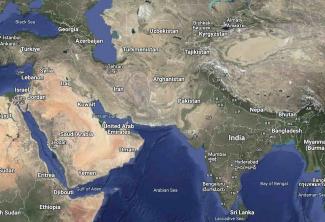India’s Art of Balancing in West Asia
The Indian foreign minister SM Krishna’s four-nation visit to Israel, Jordan, Palestine and the UAE from January 8 to 11, 2012, has been seen as the beginning of a “new approach ” in India’s foreign policy towards West Asia in general and the Arab Gulf region in particular. India has unequivocally accepted the paradigm that the relations with both Palestine as well as Israel are equally significant to its core national interests. Israel is critical to India from a defence, security and technology point of view, while Palestine is significant for humanitarian, ideological and strategic reasons. The seeds of this renewed foreign policy stance towards West Asia were sown during Prime Minister Manmohan Singh’s speech at the UN last year when Dr Singh reiterated India’s historical commitment to the cause of Palestine's independence and statehood and hoped both Palestine and Israel exist side by side amicably. However, from a policy perspective, India has entered a ‘tough game of balancing the two rivals’ in the Arab Gulf region.
India recognised Israel’s statehood in 1950 but started formal diplomatic engagements only in 1992. Since then, relations between the two countries have made rapid progress on a number of issues: defence, trade, technology, agriculture, security, and strategic interests have rapidly occupied greater attention. From a base of $200 million trade in 1992 comprising mainly of diamond, the non-defence bilateral trade between the two countries jumped to $5.6 billion in 2011. After signing the free trade agreement, bilateral trade is expected to double from $5.6 billion to $ 12 billion. Other areas of cooperation which are of immense significance include agriculture technology (currently, Israel has 27 projects in seven states in India), particularly dry-land farming, biotechnology suited to pharmaceuticals, information technology, water management such as drip and sprinkler methods, telecommunications, high-tech industries and homeland security and enhancing ‘people-to-people’ contacts.
In the field of defence, Israel has emerged as India's top arms supplier, surpassing Russia in some areas. In the past decade, defence deals worth $10 billion were signed. Over a period of five years (2002 to 2007), India concluded an approximately $5 billion defence deal, and post-2007, another deal of $1.4 billion was signed to purchase Spyder surface-to-air missiles and Barak-8 tactical air defence systems. The two countries are also working on joint projects, including long-range surface-to-air missile (LRSAM) for the Indian Navy and medium-range SAM (MRSAM) for the Indian Air Force. India may also conclude $1.8 billion deal to obtain Spike anti-tank missiles also.
Besides these agreements, India and Israel also enjoy close cooperation in sensitive areas such as security, intelligence sharing, counter-terrorism and even nuclear weaponry. Both countries have encouraged people-to-people contacts as well. In 2010, nearly 50,000 Israelis visited India, and around 20 per cent of the foreigners visiting India were from West Asia. While from India, nearly 40,000 people visited Israel, which is almost double the figure in 2009.
During the visit, Israel also assured India that it would support its candidature for permanent membership in the UN Security Council. India, as part of its diversification of oil sourcing, is considering signing a strategic long-term gas supply agreement with Israel. To date, Qatar is our largest gas supplier.
After visiting Israel, Mr Krishna met the Palestinian Authority President Mahmoud Abbas, Prime Minister Salam Fayyad and his counterpart Raid al-Maliki. This affirms India’s historical stand on the issue of Palestine, which gives a clear signal to Israel that India would like to balance its relations with Palestine. India supports an independent and united Palestine with East Jerusalem as its capital. Despite vigorous lobbying by the US-West against Mahmud Abbas’s initiative for statehood, India voted in Palestine’s favour in UNESCO. India has also given a clear signal that it won’t backtrack on UNSC, where the resolution of Palestine statehood is still pending.
Shri SM Krishna’s visit to Amman and the UAE also indicates India’s willingness to maintain and enhance its bilateral relations with Arab countries. UAE has been India’s largest trading partner, with more than $60 billion in trade, while Jordan has been a significant supplier of fertilizer to India. Approximately 2 million Indians work in the UAE and remit a substantial amount of remittances. India imports around 8 per cent of its oil needs from the UAE.
In one stroke, India has achieved three major foreign policy objectives: Israel's defence and counterterrorism support, active trade and investment support from countries like Jordan and the UAE, and, last but not least, reiterating its ideological and political support for Palestine's cause, particularly its statehood.
However, India must remain proactive towards its long-term interests in West Asia, particularly in two likely scenarios. One, the West Asian region is passing through a phase of high political volatility, hence, its foreign policy would transform; second, Iran and its nuclear problem. India needs to be meticulous in balancing between different players imbued with different interests in West Asia, for instance, the growing tension between Iran and the US on the one hand and the increasing concerns of the Arab Gulf countries towards regional instability on the other.
